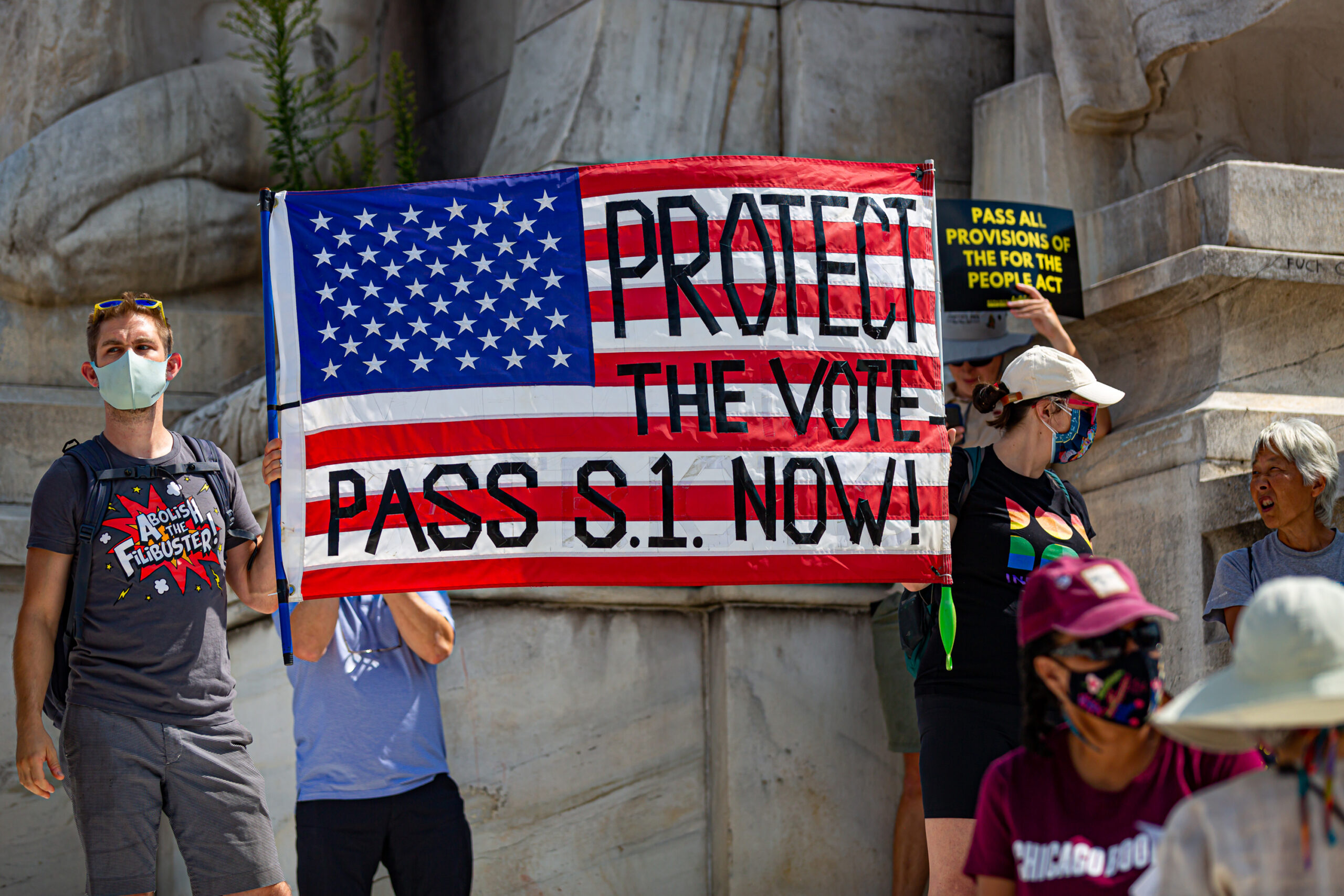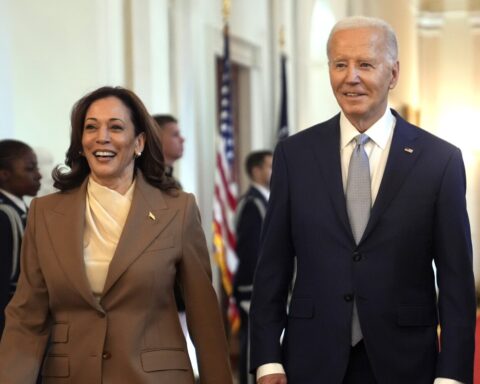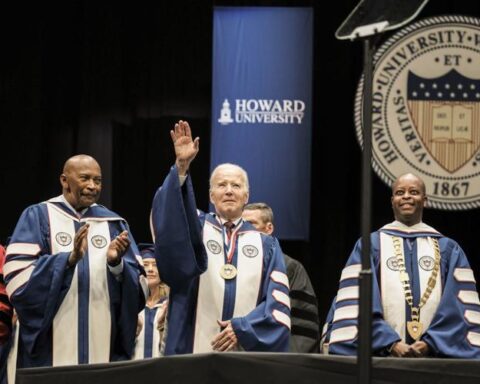More than 800 faith leaders are urging President Joe Biden and Senate Democrats to pass voting rights legislation in 2022, writing in a letter released Thursday that the issue needs to be the administration’s “number-one priority” after measures stalled in the Senate.
“We cannot be clearer: you must act now to protect every American’s freedom to vote without interference and with confidence that their ballot will be counted and honored,” the leaders said in a letter that was obtained by CNN and later released publicly on Thursday. “Passing comprehensive voting rights legislation must be the number-one priority of the administration and Congress.”
The letter, which was initially addressed only to Biden and Senate Democrats but was later widened to become an appeal to the entire chamber, comes as civil rights leaders and members of the Congressional Black Caucus are increasing pressure on the Biden administration to pass voting rights legislation after Republicans blocked two Democratic-led measures.
Congressional Black Caucus Chair Rep. Joyce Beatty, an Ohio Democrat, returned to Washington on Wednesday to hold an emergency meeting with fellow caucus members, a source familiar with planning the meeting told CNN.
The push from faith leaders comes a week after the family of Martin Luther King Jr. called for “no celebration” of MLK Day — a federal holiday on the third Monday in January commemorating the civil rights icon’s birthday — without the passage of voting rights legislation. It also follows another effort by a group of young Americans who went on a 15-day hunger strike to demand action on the issue that ended earlier this week.
Martin Luther King III and his wife, Arndrea Waters King, organized the letter along with several faith organizations. The African American Christian Clergy Coalition, Bend the Arc: Jewish Action and Faith in Public Life are among the organizers.
The faith leaders who signed the letter come from Muslim, Christian and Jewish traditions, including the Rev. Canon Leonard L. Hamlin Sr. of the Washington National Cathedral, Rabbi Danya Ruttenberg of National Council of Jewish Women and Rabbi Charles Kroloff, past president of the Central Conference of American Rabbis.
“We should be in a phase of expanding, protecting and preserving the right to vote and that’s why the redress is to come to the federal government,” Martin Luther King III told CNN, noting that more than 30 bills that restrict voting have been filed in state legislatures.
‘This relic has to go’
The leaders also urged passage of the John Lewis Voting Rights Advancement Act and the Freedom to Vote Act, the two bills that Senate Republicans have blocked, writing that “nothing — including the filibuster” should stand in the measures’ way.
“We believe the filibuster has to be abolished,” King told CNN, adding that it has been used to block key measures such as the anti–lynching legislation and civil rights legislation. “This relic has to go. It is really unfortunate that we have to have this discussion this time. … This should have already been done.”
Democrats have been frustrated with the lack of advancement on certain measures, including voting rights legislation, and many have called for eliminating or changing the filibuster. But they don’t have the votes to end the rule amid a slim majority and opposition within their own party. The Senate filibuster rule requires 60 votes to advance most legislation, and Democratic Sens. Joe Manchin of West Virginia and Kyrsten Sinema of Arizona are opposed to changing the rule to pass voting rights legislation.
Sinema, who says she supports both bills, also backs the rule “to protect the country from repeated radical reversals in federal policy which would cement uncertainty, deepen divisions, and further erode Americans’ confidence in our government,” her spokesman John LaBombard said in a statement.
Senate Majority Leader Chuck Schumer of New York spoke about passing a voting rights bill next year while on a private caucus call with fellow Democrats Tuesday night and said that “the bedrock of our democracy — free and fair elections — is at stake,” a Democratic source told CNN.
“We must — for the sake of our democracy — make it so that the Senate can debate and reach final conclusion on voting rights legislation this Congress. And soon,” Schumer said, according to the source.
That same night, Beatty called for the Senate, which is on recess for the holidays, to reconvene to “send meaningful voting rights legislation” to Biden’s desk.
Biden, who has said he is open to changing the filibuster to pass voting rights legislation, also promised last week that he would continue to fight to pass voting rights, telling graduates at South Carolina State University that “this battle is not over” and urging lawmakers to pass the two voting rights bills blocked by Senate Republicans.
“We’re going to keep up the fight until we get it done, and you’re going to keep up the fight, and we need your help badly,” he said at the commencement ceremony at the historically Black university.
A message deeper than voting rights
As Biden and other Democrats vow to keep fighting for voting rights, faith leaders say lawmakers must do more than make promises. The Kings believe the President and Congress must put forth a full effort in order for there to be victory on voting rights legislation.
“We’ve seen what happens when the White House and Congress put their full power and effort behind something that they support. We’ve seen it with the infrastructure bill,” Arndrea Waters King told CNN, adding that’s why they and other activists will cross symbolic bridges on MLK Day weekend. “We’re crossing these bridges physically to say that you stood for bridges, now it’s time to stand for the people.”
Dr. Stephany Spaulding, pastor of Ebenezer Baptist Church in Colorado Springs, Colorado, said the letter sends another message besides protecting voting rights.
“Deeper than that is the reality that we can no longer continue to exploit the lives and the pain of our communities,” Spaulding told CNN. “Every two to four years we see politicians coming to sacred space, to our congregations, and making promises to our members and saying how life in this realm is going to get better for our congregations and members. And then we end up in moments like this, where we are on the brink of tremendous failure.”
She continued, “As sacred as our trust in them as politicians is, it’s also sacred for them to uphold the righteousness of which they speak.”





